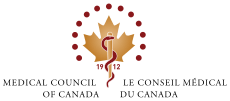Medical Council of Canada
[1]Medical Council of Canada (MCC) (French: Le Conseil médical du Canada) is an organization charged with the assessment of medical candidates and evaluation of physicians through examinations. It grants a qualification called Licentiate of the Medical Council of Canada (LMCC) to those who wish to practise medicine in Canada.
  | |
| Motto | Vigilantia (Vigilance) |
|---|---|
| Formation | 1912 |
| Type | Professional association |
| Headquarters | Ottawa, Ontario |
| Location |
|
Membership | Physicians |
Official language | English and French |
Executive Director | Dr. M. Ian Bowmer |
| Website | www.mcc.ca |
MCC is governed by a 51-member Executive Board of Council, who meets annually to discuss budgets, policies and assets. The day-to-day operation is carried out by the Executive Director, currently Dr. M. Ian Bowmer.
History
Founded by the Canada Medical Act in 1912 through the effort of Sir Thomas Roddick, a physician and Member of Parliament, who have been pursuing a standardized licensing scheme in Canada for over 18 years.[2]
Beginning April 1912, MCC gave the right to practise throughout Canada, to be admitted to the British Medical Register (BMR) to serve in the medical forces of the army and navy.[3] The practice for registering physicians into the BMR eventually ceased but those who wish to practise in the UK can register themselves with the General Medical Council.
From January 1979 to November 2018 the Medical Council of Canada Evaluating Examination (MCCQEE) was offered. A pass on this exam used to be required for international medical graduates to attempt the MCCQE Part I. As of 2019, all medical graduates regardless of whether they graduate from a Canadian or international medical school, are able to write the MCCQE Part I.
Examinations
| Exam | Candidates | Type of Assessment | Cost | Passing Score | Attempts Allowed | Where |
|---|---|---|---|---|---|---|
| Medical Council of Canada Qualifying Examination Part I (MCCQE Part I) |
Medical students within 12 months of graduation and medical graduates |
|
$1,230 CDN [4] | 226 (scaled score from 100-400) | 4, the exam cannot be retaken if you have previously passed | in over 80 countries at Prometric testing centres, 5 times each year |
| Medical Council of Canada Qualifying Examination Part II (MCCQE Part II) |
Candidates who passed the MCCQE Part I and have completed 12 months of postgraduate medical training |
|
$2,780 CDN[5] | 138 (scaled score from 50-250) | 4, the exam cannot be retaken if you have previously passed[6] | in certain Canadian cities on a weekend in early May and late October |
A pass standing is required on both the MCCQE Part I and the MCCQE Part II in order to be awarded Licentiate of the Medical Council of Canada (LMCC). LMCC is recognized by the twelve medical licensing authorities in Canada, and is one of the requirements for the issuance of a licence to practise medicine in Canada.[7]
Licentiate
Licentiate of the Medical Council of Canada, commonly abbreviated as LMCC, is a physician that, according to the bylaws of MCC:
- Before 1 January 1992: Passed Medical Council of Canada Qualifying Examination (MCCQE) Part 1 and has completed successfully one year of postgraduate training or the MCCQE Part 2
- After 1 January 1992: Passed the MCCQE Part 1 and Part 2 [8]
Canadian Medical Register
MCC also maintains the Canadian Medical Register, a list of physicians who have completed or have been exempted from the LMCC requirement. This is the first step for medical graduates who wish to obtain licence to practise prior to applying to their own regulatory body in their home province or territory.[9]
References
- Lougheed, Taylor (2016-03-31). "Is it time to rethink the MCCQE Part II?". Canadian Medical Education Journal. 7 (1): e87–e88. ISSN 1923-1202. PMC 4830377. PMID 27103957.
- A brief history of the Medical Council of Canada – 1912 to 2008 Archived 2008-09-21 at the Wayback Machine
- Roddick Gates Honour Canada's Foremost Physician
- "MCCQE Part I | Medical Council of Canada". mcc.ca. Retrieved 2019-08-30.
- "MCCQE Part II | Medical Council of Canada". mcc.ca. Retrieved 2019-08-30.
- "Application and eligibility | Medical Council of Canada". mcc.ca. Retrieved 2019-08-30.
- Centre for the Evaluation of Health Professionals Educated Abroad
- Licentiate of the Medical Council of Canada (LMCC) Archived 2008-09-16 at the Wayback Machine
- The Process of Becoming a Licensed Medical Doctor in BC Archived 2008-09-14 at the Wayback Machine
External links
- Medical Council of Canada Home Page
- Description of LMCC - Association of International Physicians and Surgeons of Ontario.